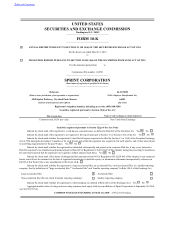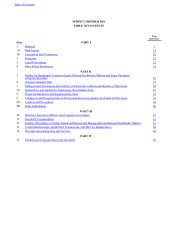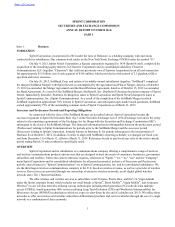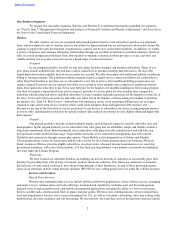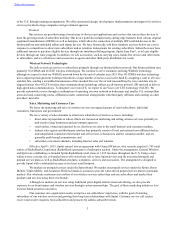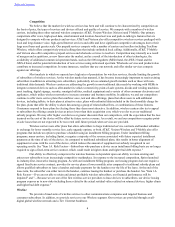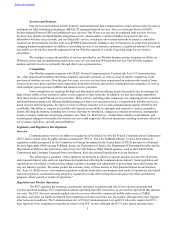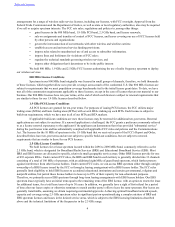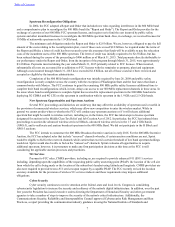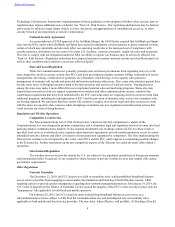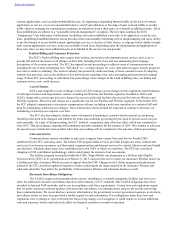Sprint - Nextel 2014 Annual Report Download - page 7
Download and view the complete annual report
Please find page 7 of the 2014 Sprint - Nextel annual report below. You can navigate through the pages in the report by either clicking on the pages listed below, or by using the keyword search tool below to find specific information within the annual report.
Table of Contents
5
Services and Products
Our services and products include domestic and international data communications using various protocols such as
multiprotocol label switching technologies (MPLS), IP, managed network services, Voice over Internet Protocol (VoIP),
Session Initiated Protocol (SIP) and traditional voice services. Our IP services can also be combined with wireless services.
Such services include our Sprint Mobile Integration service, which enables a wireless handset to operate as part of a
subscriber's wireline voice network, and our DataLinkSM service, which uses our wireless networks to connect a subscriber
location into their primarily wireline wide-area IP/MPLS data network, making it easy for businesses to adapt their network to
changing business requirements. In addition to providing services to our business customers, a significant amount of voice and
data traffic on our wireline network originates from our Wireless segment as a result of growing usage by our wireless
subscribers.
We continue to assess the portfolio of services provided by our Wireline business and are focusing our efforts on
IP-based services and de-emphasizing stand-alone voice services and non-IP-based data services. Our Wireline segment
markets and sells its services primarily through direct sales representatives.
Competition
Our Wireline segment competes with AT&T, Verizon Communications, CenturyLink, Level 3 Communications,
Inc., other major local incumbent operating companies and cable operators, as well as a host of smaller competitors in the
provision of wireline services. Over the past few years, our voice services have experienced an industry-wide trend of lower
revenue from lower prices and increased competition from other wireline and wireless communications companies, as well as
cable multiple system operators (MSOs) and Internet service providers.
Some competitors are targeting the high-end data market and are offering deeply discounted rates in exchange for
high-volume traffic as they attempt to utilize excess capacity in their networks. In addition, we face increasing competition
from other wireless and IP-based service providers. Many carriers, including cable companies, are competing in the residential
and small business markets by offering bundled packages of both voice and data services. Competition in wireline services is
based on price and pricing plans, the types of services offered, customer service and communications quality, reliability and
availability. Our ability to compete successfully will depend on our ability to anticipate and respond to various competitive
factors affecting the industry, including new services that may be introduced, changes in consumer preferences, demographic
trends, economic conditions and pricing strategies. See "Item 1A. Risk Factors—Competition, industry consolidation, and
technological changes in the market for wireless services could negatively affect our operations, resulting in adverse effects on
our revenues, cash flows, growth, and profitability."
Legislative and Regulatory Developments
Overview
Communications services are subject to regulation at the federal level by the Federal Communications Commission
(FCC) and in certain states by public utilities commissions (PUCs). Since the SoftBank Merger, we have been subject to
regulatory conditions imposed by the Committee on Foreign Investment in the United States (CFIUS) pursuant to a National
Security Agreement (NSA) among SoftBank, Sprint, the Department of Justice, the Department of Homeland Security and the
Department of Defense (the latter three collectively, the USG Parties). Other federal agencies, such as the Federal Trade
Commission and Consumer Financial Protection Bureau, have also asserted jurisdiction over our business.
The following is a summary of the regulatory environment in which we operate and does not describe all present
and proposed federal, state and local legislation and regulations affecting the communications industry. Some legislation and
regulations are the subject of judicial proceedings, legislative hearings and administrative proceedings that could change the
way our industry operates. We cannot predict the outcome of any of these matters or their potential impact on our business.
See "Item 1A. Risk Factors—Government regulation could adversely affect our prospects and results of operations; the federal
and state regulatory commissions may adopt new regulations or take other actions that could adversely affect our business
prospects, future growth or results of operations."
Regulation and Wireless Operations
The FCC regulates the licensing, construction, operation, acquisition and sale of our wireless operations and
wireless spectrum holdings. FCC requirements impose operating and other restrictions on our wireless operations that increase
our costs. The FCC does not currently regulate rates for services offered by commercial mobile radio service (CMRS)
providers, and states are legally preempted from regulating such rates and entry into any market, although states may regulate
other terms and conditions. The Communications Act of 1934 (Communications Act) and FCC rules also require the FCC's
prior approval of the assignment or transfer of control of an FCC license, although the FCC's rules permit spectrum lease

